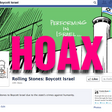Activism and BDS Beat 13 December 2013
“My hope would be that responsible university leaders will become very reluctant to see their university’s funds used to finance faculty membership and faculty travel to an association that is showing itself not to be a scholarly association but really more of a political tool,” Summers told PBS host Charlie Rose on 10 December.
Summers was reacting to the ASA leadership’s endorsement of the Palestinian call for a boycott of Israeli institutions, which is being put to a referendum of the full ASA membership this week.
Summers claimed that the boycott singled out Israel and was “anti-semitic in effect,” recalling his 2002 statement against divestment from Israel.
Although Rose did put to Summers the systematic violation of Palestinian rights, including the right to education, Summers did not respond to the substantive concerns that have motivated the ASA decision.
By focusing on the “singling out” argument, Summers is distracting from the effects of Israel’s occupation and other violations on Palestinians.
It is ironic that as a former university president, Summers – who called the notion of academic boycott “abhorrent” – would propose punitive measures against scholars exercising their freedom of conscience and association.





Comments
Once again...
Permalink Matt Graber replied on
Summers repeats the same lines he used to smear BDS efforts in 2002, saying that they "are anti-semitic in their effect, if not their intent."
In that instance, Judith Butler responded in the London Review of Books, "No, its not anti-semitic: the right to criticize Israel."
Butler's response in the LRB then, as well as Noura Erakat's recent writings in Jadaliyya, demonstrate how the ASA boycott of Israel is creating an expanded space for dialogue and critique of Zionist settler-colonialism:
"One is threatened with the label ‘anti-semitic’ in the same way that one is threatened with being called a ‘traitor’ if one opposes the most recent US war. Such threats aim to define the limits of the public sphere by setting limits on the speakable. The world of public discourse would then be one from which critical perspectives would be excluded, and the public would come to understand itself as one that does not speak out in the face of obvious and illegitimate violence."
Link: http://www.lrb.co.uk/v25/n16/j...
israeli anti-semitism
Permalink Janice Kelly replied on
Apparently the current Isaeli leadership and concuring Israeli citizens have forgotten that Jewish scholarly tradition upholds compassion, and therefore said leaders are themselves anti-semiitic towards their own nation.